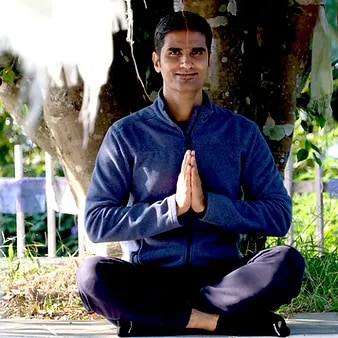Exploring the 4th Niyama: Svadhyaya
by Hardik Mehta

Yoga is more than just physical postures; it is a holistic practice that encompasses the mind, body, and spirit. Within the comprehensive framework of yoga philosophy, the Yamas and Niyamas serve as ethical guidelines, laying the foundation for a disciplined and meaningful life. One of the most profound and transformative Niyamas is Svadhyaya, which translates to “self-study” or “self-reflection.” This practice is integral to yoga, offering a path to deep inner wisdom and spiritual growth.
Understanding Svadhyaya – The Path to Self-Study and Inner Wisdom
Svadhyaya is derived from two Sanskrit words: “Sva,” meaning self, and “Adhyaya,” meaning study or education. Together, they imply the study of the self. This Niyama encourages practitioners to delve deep into their inner being, exploring their thoughts, emotions, and actions. Svadhyaya is about understanding who we truly are beyond our external identities and societal roles.
The Importance of Self-Study in Yoga
Self-Awareness and Mindfulness: Svadhyaya promotes self-awareness, enabling practitioners to recognize their habits, patterns, and behaviors. This heightened awareness fosters mindfulness, allowing individuals to live more consciously and make intentional choices.
Inner Growth and Transformation: By engaging in self-study, practitioners can identify areas of their lives that need improvement. This process of self-inquiry leads to inner growth and transformation, helping individuals align their actions with their higher selves.
Connection with the Divine: Svadhyaya is also a spiritual practice that deepens one’s connection with the divine or higher consciousness. Through the study of sacred texts, chanting mantras, and meditation, practitioners cultivate a sense of oneness with the universe.
Overcoming Challenges: Self-study provides the tools to navigate life’s challenges with resilience. By understanding their inner workings, individuals can respond to difficulties with clarity and composure.
Practicing Svadhyaya
Incorporating Svadhyaya into your daily routine can be transformative. Here are some practical ways to practice self-study:
Journaling: Writing down your thoughts, feelings, and experiences is a powerful way to engage in self-study. Journaling helps you reflect on your day, recognize patterns, and gain insights into your inner world.
Reading Sacred Texts: Studying spiritual texts such as the Bhagavad Gita, Yoga Sutras, or any literature that resonates with you can provide profound insights. These texts often offer wisdom and guidance for personal and spiritual growth.
Mindful Asana Practice: Yoga postures (asanas) are often the starting point for many practitioners. Through Svadhyaya, asanas become more than physical exercises; they transform into tools for self-discovery. By practicing mindfully, one can observe physical sensations, emotions, and thoughts that arise, leading to greater self-awareness.
Pranayama: The practice of controlled breathing (pranayama) is another avenue for Svadhyaya. Paying attention to the breath helps quiet the mind and brings awareness to the present moment. This heightened awareness is the essence of self-study, revealing how breath influences mind and body.
Meditation: Regular meditation allows you to observe your thoughts without judgment. This practice cultivates self-awareness and helps you connect with your inner self on a deeper level.
Chanting and Mantras: Repeating mantras or chanting can have a calming effect on the mind and body. It also aids in focusing the mind and connecting with higher consciousness.
Self-Reflection: Take time each day to reflect on your actions, thoughts, and emotions. Ask yourself questions like, “Why did I react that way?” or “What can I learn from this experience?” This practice encourages continuous self-improvement.
Svadhyaya and Modern Life
In today’s fast-paced world, the practice of Svadhyaya is more relevant than ever. With constant distractions and external pressures, taking time for self-study can ground us and provide a sense of clarity and purpose. Here’s how Svadhyaya can be integrated into modern life:
Digital Detox: Set aside time each day to disconnect from digital devices. Use this time for self-reflection, reading, or meditation. Reducing screen time can help you connect more deeply with yourself.
Mindful Living: Incorporate mindfulness into your daily activities. Whether you’re eating, walking, or working, stay present and observe your thoughts and feelings. This practice enhances self-awareness.
Personal Development: Engage in continuous learning and personal development. Attend workshops, read books, or take courses that promote self-growth and self-awareness.
Therapy and Counseling: Seeking professional help through therapy or counseling can be an effective form of self-study. It provides a safe space to explore your thoughts, feelings, and behaviors with guidance from a trained professional.
The Benefits of Svadhyaya
The practice of Svadhyaya offers numerous benefits, enriching both your yoga practice and everyday life:
Enhanced Self-Knowledge: By studying yourself, you gain a deeper understanding of your strengths, weaknesses, and motivations. This self-knowledge empowers you to make positive changes.
Emotional Balance: Svadhyaya helps you manage your emotions more effectively. By recognizing and understanding your emotional triggers, you can respond to situations with greater equanimity.
Spiritual Growth: Engaging in self-study fosters spiritual growth. It deepens your connection with your true self and the divine, leading to a more meaningful and fulfilling life.
Improved Relationships: Understanding yourself better allows you to relate to others more authentically. It enhances your communication skills and fosters empathy and compassion in your relationships.
Resilience and Adaptability: Self-awareness and self-study equip you with the tools to adapt to change and overcome challenges. You become more resilient and capable of navigating life’s ups and downs with grace.
Svadhyaya, the fourth Niyama, is a powerful practice that encourages self-study and inner exploration. By incorporating Svadhyaya into your daily life, you can achieve greater self-awareness, emotional balance, and spiritual growth. Whether through journaling, reading sacred texts, meditation, or mindful living, the journey of self-study leads to a deeper understanding of yourself and your place in the universe. It is a timeless practice that enriches our lives, helping us navigate the complexities of the world with wisdom and clarity. Embrace Svadhyaya as a cornerstone of your yoga practice and witness the transformative power of self-study unfold in your life.
Sayujya Yoga, the best yoga institute in Mumbai, offers comprehensive 200 Hours Yoga Teacher Training Courses (TTC) and short courses. Renowned as one of the top yoga schools in Mumbai, Sayujya Yoga blends traditional philosophies with contemporary practices, providing a holistic approach to yoga. Whether you’re interested in Hatha Yoga Teacher Training in Mumbai or Ashtanga Yoga Teacher Training in Mumbai, Sayujya Yoga caters to all levels. Recognized for having the best yoga teachers in Mumbai, they ensure a transformative experience. If you’re seeking the best yoga teacher training in India, look no further than this premier yoga class in Mumbai.
About the Author

Hardik Mehta
Hardik is an E-RYT 500 & YACEP (Yoga Alliance Continuing Education Provider), Yoga Alliance, USA. He has been practicing yoga for the last 9 years. Prior to finding his true calling in Yoga, he was working with various corporates for 12 years in the Retail and eCommerce sector.
